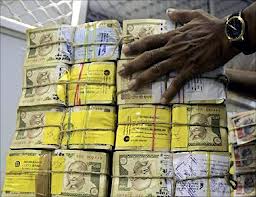 The rupee on Wednesday sank to 10-month lows before closing with 21-paise loss at 56.17, making imports costlier that is likely to worsen government's current account deficit woes and hit the common man hard.
The rupee on Wednesday sank to 10-month lows before closing with 21-paise loss at 56.17, making imports costlier that is likely to worsen government's current account deficit woes and hit the common man hard.
The fall would have been much more pronounced, had there not been sustained capital inflows worth of over $100 million in equities, forex dealers said.
At the Interbank Foreign Exchange market, the domestic unit commenced lower at 56.18 a dollar from previous close of 55.96.
While it recovered to 56.00 but it quickly fell back to a low of 10-month low of 56.37, before settling at 56.17 -- a fall of 21 paise or 0.38 per cent.
On Tuesday, it had tumbled by 39 paise or 0.70 per cent.
The rupee has slumped by over 4.4 per cent in May so far.
Pramit Brahmbhatt, CEO, Alpari Financial Services (India) said: "The heavy demand for the dollar from gold, oil importers and defence-related
"However, the rupee's fall was capped as dollar traded weak against other major currencies later."
The global rally in dollar and concerns about India's CAD has depreciated rupee this month despite of huge foreign inflows into stocks and debt, he added.
A weak rupee will make imports costlier, including oil and other commodities, that will have a cascading effect on inflation.
CAD hit a record high of 6.7 per cent of GDP in Q4 2012 and was expected to narrow to 4-4.5 per cent of the GDP in the first quarter of this calendar year on the back of cheaper commodities.
IDBI Bank Head of Treasury N S Venkatesh said: "Rupee weakness was mainly due to strengthening of dollar against all major currencies on the back of positive economic data emanating from that country.
However, rupee recovered in the later half in sync with Euro."









